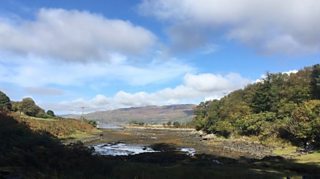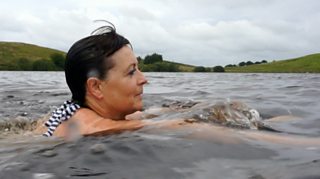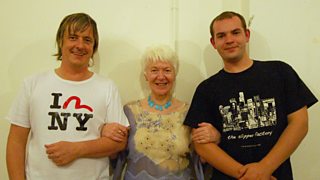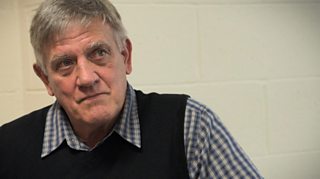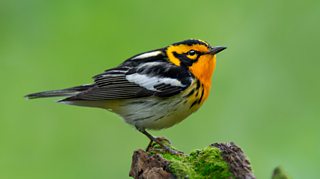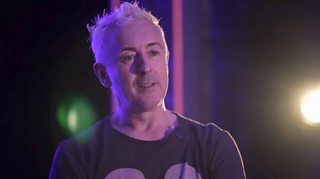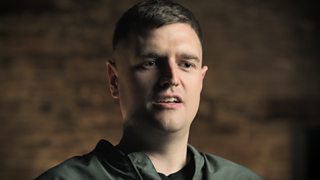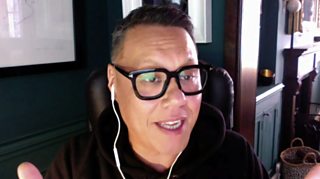“It’s not utopia” — 16 years on from when the community took control of the tiny Isle of Gigha, off Scotland’s west coast
16 February 2018

It seems like a story from the big screen: and taking control of their own destiny. But this is what happened in 2002 when the Isle of Gigha was purchased for £4m in a community buyout. to find out whether self-governance is a dream – or a nightmare.
It’s been a success: Joe Teale, shopkeeper
“Without question, the buyout has been a good thing. We’ve got B&Bs that can flourish, we’ve got a restaurant, we’ve got more kids in our school. People are able to buy and own their own houses for the first time.
“We’ve spent about £4m improving, insulating and upgrading the homes that the [Isle of Gigha Hertage] Trust owns.
“[We’ve had] benevolent landlords. You can’t say that private ownership of land is exclusively bad, because it isn’t. But there was a sustained period of under-investment in the fabric of this island.
“Is it perfect? Absolutely not. Without doubt there’s more squabbling, more infighting, perhaps more cliquey aspects to living here than there was prior to the formation of the Trust. But you’ve got to take the rough with the smooth.”

We shouldn’t have done it: Alasdair McNeill, Director of the Isle of Gigha Heritage Trust
“We never had any real bad landlords. I personally would rather have a benevolent dictator than this so-called democracy we have.
We still have a lot to pay back yet. It’s not utopia.
“I voted against [the buyout]. Not that I didn’t want the island, I wanted it very much. But I knew that it would be difficult, there would be great difficulty in running the place. It’s not utopia.
“I’ve lived all over the world and there’s nowhere better than Gigha on a summer’s day. People come and think ‘Ah, I want to live here’. But then the winter comes and the gales come and the rain comes and they can’t get off the island, or they can’t get back on. And this is where their idea of utopia changes and they get bitter.
“I would try and bring in young people. Without children we have nothing. We need children so we have teachers and people get educated, and then come back and get some good business going. The people that come into the island... we need them to have jobs.”
Community buyouts in Scotland
-
![]()
Residents have backed a community buyout plan for the island of Ulva.
-
![]()
How Gigha’s population has changed since the buyout in 2002.
-
![]()
A crowdfunding appeal looks set to be launched to help fund a community buyout at Cape Wrath in Sutherland.
-
![]()
Residents of the Isle of Eigg are marking 20 years since a community buyout of the island.
-
![]()
The residents of Wanlockhead havey lofty ambitions for its future.
-
![]()
MSPs have passed a bill giving communities the right to buy land or buildings in their area.
The full episode of Open Country
-
![]()
Ian Marchant journeys to the Inner Hebridean island of Gigha, off the west coast of Scotland to discover how life has changed since the community buyout.
Latest features from ≥…»ÀøÏ ÷ Scotland
-
![]()
'Wild swimming helps me process the grief of losing my son'
The benefits of cold water therapy.
-
![]()
Winter adventures are appealing, but an expert advises caution
Trips in winter require particular knowledge and skills.
-
![]()
The rescuers: Why volunteers risk their lives in mountain emergencies
Landward meets members of the Cairngorm Mountain Rescue Team.
-
![]()
‘Look for the light’ – practical tips to help you through another winter with SAD
Useful advice and tips to combat low moods at this time of year.
-
![]()
How you could be a binge drinker without even knowing
Binge drinking is classed as fewer units than many people may realise.
-
![]()
How chocolate biscuits and drama classes helped one man leave prison behind
The healing power of creativity.
-
![]()
'When people believe in you, it’s life-changing'
Author Graeme Armstrong revisits the man who helped turn his life around.
-
![]()
The 'breath-taking' display of US birds swept on to British soil
Recent storms have brought rare birds to our shores.
-
![]()
Six things we learned about Alan Cumming on Take the Floor (Spoiler: includes accordions)
The actor spoke to Take the Floor's Gary Innes.
-
![]()
How street gangs trap young men in a dangerous cycle of violence
The almost inescapable pull of life in a gang.
-
![]()
Why stylist Gok Wan believes there's no such thing as bad fashion
The fashion expert says we should stop following rules and do what feels right.
-
![]()
Is sending a CV still the right way to apply for a job?
They've been central to job applications for years, but are they worth it?
